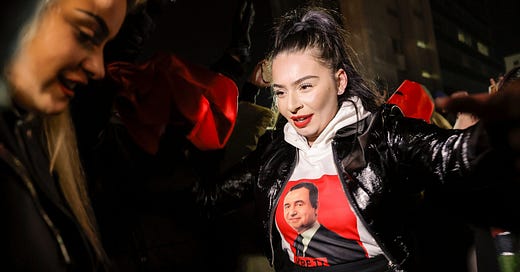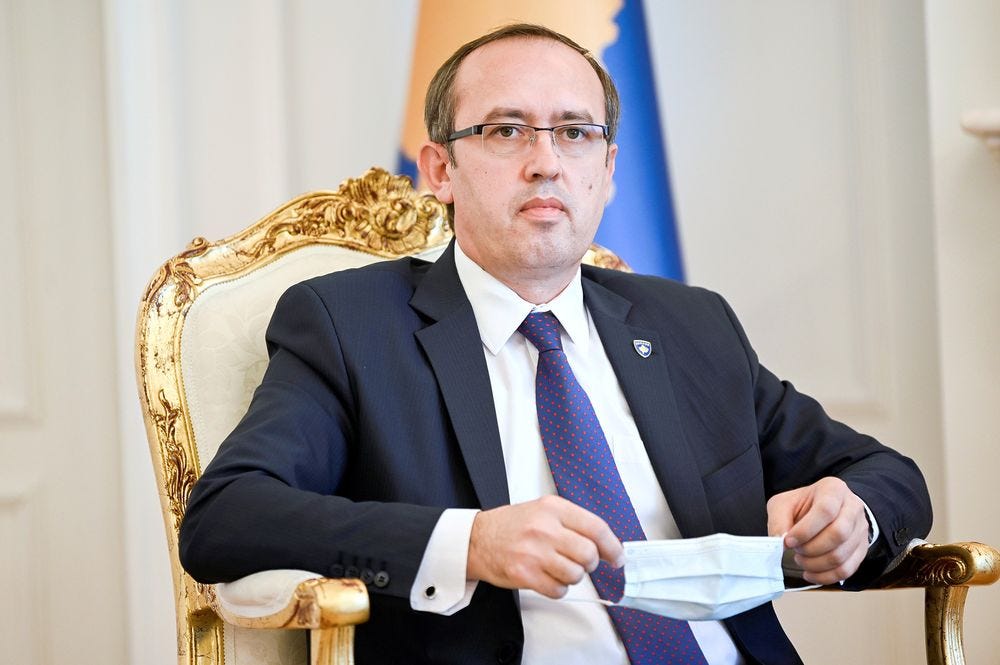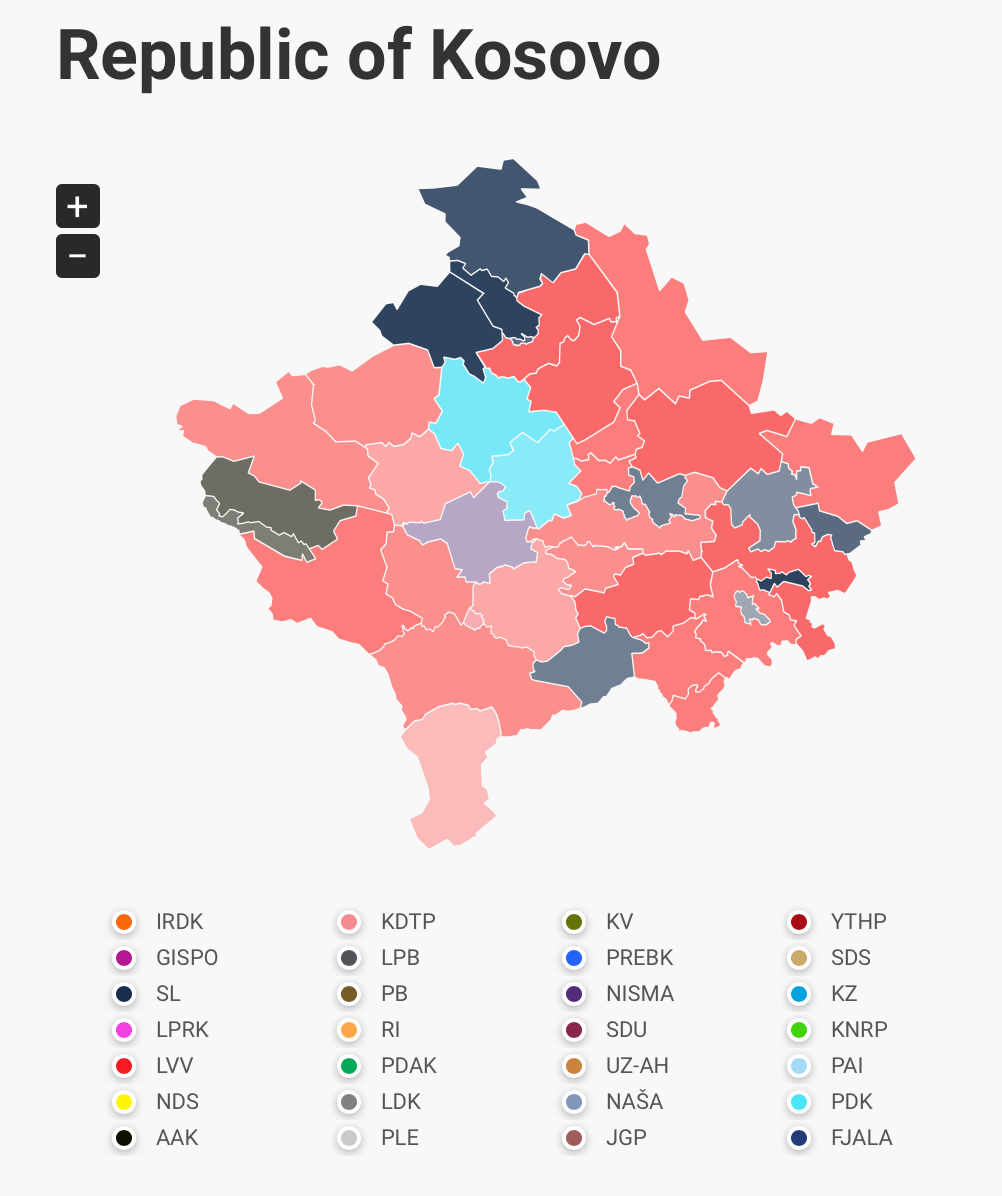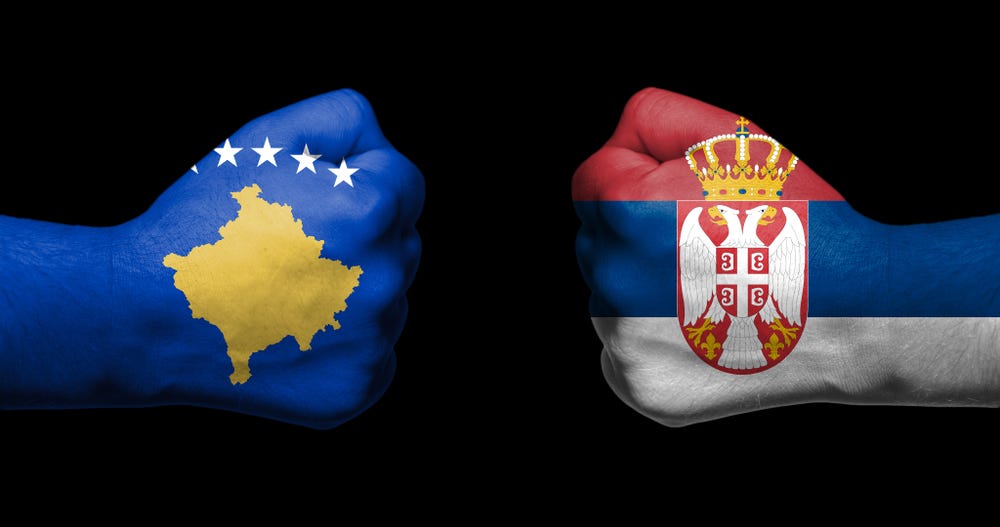XXXV. Eternal sunset of the spotless countries
Kosovo election results are a triumph for the left-wing nationalist and anti-Serbian party. The EU facilitated dialogue with Belgrade is under threat, but erasing the past is not an option
Hi,
welcome back to BarBalkans, the Italian newsletter whose aim is to give a voice to the Western Balkans’ stories, on the 30th anniversary of the Yugoslav Wars.
The semi-quote from the movie with Kate Winslet and Jim Carrey is not accidental. Kosovo left Serbia (years ago) and through last Sunday’s election (February 14) is trying to erase the memories of their relationship.
However, the more Pristina strives to forget that its future is linked to dialogue with Belgrade, the more their shared memories will force them to start a new relationship.
Controversial elections
Let’s start from the news.
The early elections for the renewal of the Assembly of the Republic of Kosovo held on February 14, 2021, were the sixth in a row (to be anticipated) in the last 13 years.
This means that no government has ever finished out its four-year term since February 17, 2008, when the country has declared (unilaterally) the independence from Serbia.
Kosovo lives in a climate of political instability.
We need to put some pieces together to understand how Kosovo faced the elections and why it wants to erase the relationship with Serbia.
The previous round of voting was held just a year and a half ago, on October 6, 2019.
Even that time [spoiler], the Albanian nationalist left-wing party Vetëvendosje (Self-determination Movement) won the election.
But it needed an alliance with the center-right party Democratic League of Kosovo (LDK) to take over the government.
Vetëvendosje leader, Albin Kurti, was elected prime minister on February 3, 2020.
But only 51 days later, LDK decided to dismiss Kurti.
Avdullah Hoti became prime minister, supported by a rainbow coalition. There were the liberal conservatives, the social democrats, the right-wing and the Serb List (SL), the party of the Serbian minority.
Anyone to be able to reach the majority of seats in the Parliament, set at 61 (out of 120).
There was even Etem Arifi, a lawmaker sentenced to 15 months in jail in August 2019 for corruption. He was supposed to be under house arrest, but on June 3, 2020, he was voting the confirmation of the cabinet.
He turned out to be decisive.
On December 21, the Constitutional Court rendered invalid the vote and Hoti was forced to resign.
The Parliament was dissolved.
A couple of other elements complete the picture.
Kosovo is currently without a president, since Hashim Thaçi was accused of war crimes by the Kosovo Special Court (based in The Hague) on 5 November.
At the moment, Vjosa Osmani is the acting president (until the expiry of Thaçi’s mandate in April). She has been Kurti’s ally since two years ago, when she was leader of LDK, and also last Sunday, when she ran as an independent candidate.
Vetëvendosje leader Kurti is at the center of the controversies.
According to a verdict of the Constitutional Court (“people who are found guilty of a criminal offence in the last 3 years are not eligible to run for a seat in Parliament”), Kurti was not eligible.
He was convicted for throwing tear gas in the Parliament as a protest against two government proposals in March 2018.
Nationalists and minorities
What happened in this troubled Valentine’s Day election?
The anti-establishment nationalist left-wing party Vetëvendosje literally triumphed. Thanks to 47.85% of ballots it almost reached the absolute majority.
It could almost rule alone, with no risk of troubles from the allies.
But there is a 3% gap or a little less to fill. And someone has to do it.
Considering the center-right parties, certainly not the Democratic League of Kosovo (LDK), responsible for what happened last year. Moreover, dismissing Kurti in March 2020 did not even help LDK: from 24.55% of ballots in 2019 it fell to 13.08%.
The Democratic Party of Kosovo (PDK) also fell - from 21.23% of ballots in 2019 to 17.36% - paying for the troubles of former president Thaçi.
And then there are all the other parties.
Considering the electoral threshold of 5%, they should be very few. The right-wing nationalist party Alliance for the Future of Kosovo (AAK), with 7.4%, and the Serb List (SL), with 5.56%.
However, in Kosovo the ethnical minorities have a complex weight. 20 seats out of 120 are reserved for them.
10 seats are distributed in this way:
1 to the Egyptian minority (New Democratic Initiative of Kosovo, IRDK);
1 to the Askhali minority, the Balkan Egyptians (Democratic Ashkali Party of Kosovo, PDAK);
1 to the Gorani minority, the Slavic Muslim group (Unique Gorani Party, JGP);
2 to the Roma minority (Roma Initiative, RI);
2 to the Turkish minority (Turkish Democratic Party of Kosovo, KDTP);
3 to the Bosnian minority (Vakat Coalition and United Community)
The others are reserved to the Serbian ethnic minority. And on last Sunday, with its apparently modest result, Serb List won all the 10 seats.
[If you want to play with interactive infographics, you can click on the image below and find out the details of 2021 Kosovan parliamentary elections]
And now, let’s analyze the data.
First of all, we have to consider that less than one Kosovar citizen with voting rights out of two went to the polls (turnout of 47%). 1,794,862 names appeared in the final list of voters (143 thousand voters less than the previous 2019 elections).
On the final results map the dominant color - as the electoral performance - is the nationalist left-wing red. From light red (24%) to deep red (64%).
We can see few glaring exceptions.
In the central area, there are two PDK blue strongholds (63/72%) and a social democratic NISMA purple district (nevertheless, the party failed to enter the Parliament).
On the border with Montenegro, the nationalist right-wing AAK dark green area (47/52%) conquered the region where the (dis)agreement on the territorial delineation in 2018 caused the drop of tear gas in the Assembly.
And then there are the territories populated by the Serbian minority. Very recognizable, from gray (39%) in the central-southern districts to deep blue (86%) on the border with Serbia. It was a real plebiscite for the Serb List.
«The elections were held in special circumstances, because of the pandemic and the series of tricks that Pristina used to reduce the power of the Serb people, that is the Serb List. We dealt with their intentions through unity».
This was the comment of Serb List leader, Goran Rakić, the day after the elections.
Considering Vetëvendosje political positions, Serb List will oppose to the new government, endorsed by Belgrade.
We must say that Vetëvendosje will not need a large coalition. It is expected to gain 55 seats in Parliament, with the majority set at 61.
It will be enough to raise votes among non-Serbian minorities.
The real problem stands with the anti-Serbian starting positions of the new party that should give stability to the political scene in Kosovo. And now we come back to our movie.
Eternal sunset of the spotless countries.
Struggling with diplomacy
Serbia and Kosovo are two elephants that have been swinging on a thin diplomatic web for 13 years.
A web made up of Pristina’s independence claims and Belgrade’s refusal to recognize Kosovo as an independent State.
A web made up of international players who are trying to rescue the acrobatic pachyderms. In particular, the European Union and the United States.
A relationship complicated by a cumbersome past - with an ethnic war in the late Nineties - that can only be resolved by dialogue and diplomacy.
Let’s say that the first statement of the ‘Che of Kosovo’ shook dangerously the web up:
«The dialogue with Serbia is in sixth or seventh place on our agenda. Structural reforms, justice and work are our priorities. This victory will be remembered as the day when the people spoke with one voice, taking their fate into their own hands».
Kurti would like to erase the past, the present and the future of Kosovo-Serbia relationship. He would like to interrupt the dialogue.
But no one was pleased with his statement.
Brussels is all over this.
German MEP Viola von Cramon-Taubadel (The Greens), rapporteur on Kosovo at the EU Parliament, was imperious:
«The new government will have to progress on the road to European integration and to continue the dialogue with Serbia».
The EU Commission shows a wait-and-see attitude, «expecting the new authorities in Pristina to engage constructively», the High Representative of the Union for Foreign Affairs and Security Policy, Josep Borrell, declared.
Joe Biden’s statement is of fundamental importance. The new US president spoke about «a good collaboration with a sovereign, independent, multiethnic and democratic country», that can only be realized through «a normalization agreement with Serbia, focused on mutual recognition».
Serbian prime minister, Ana Brnabić, accused the counterpart:
«Kurti’s statement is deplorable and demonstrates the lack of seriousness of the political leadership in Pristina. Dialogue is the only way to reach an agreement on the normalization of our relations, to make progress and to ensure stability».
The prime minister also made a very acute observation:
«With no dialogue, Pristina has no real perspective. More than half of the countries in the world have not recognized the so-called independent Kosovo».
And now, we can end this newsletter with some political predictions, considering how Belgrade has shown that it does not want to be erased from Pristina’s memories.
What will happen in the future of Kosovo-Serbia relations?
Some comments on the spur of the moment
This is the paragraph that will be useful in the future, when we will want to find out how many predictions were right. And how many really did not.
It is not only a journalistic divertissement, but mostly a way to be prepared to - probable - future scenarios, starting from reliable data.
A way to read the political reality that we will comment again.
The first prediction is that the new government will force the hand with words, but in practice it will not avoid the dialogue.
Because it has everything to lose and nothing to gain from closing the door on diplomacy.
It is true that half of the countries in the world do not recognize the independent Kosovo, but Pristina can count on two main sponsors: the United States and the European Union.
Their position is clear: the region needs stabilization and the way to get it is through the normalization of Kosovo-Serbia relations.
After all the tensions and disagreements between the two powers caused by Donald Trump’s administration, finally Brussels and Washington restored harmony.
Thanks to the new Democratic president, Joe Biden, the United States and the European Union are gradually rowing in the same direction.
Moreover, the EU is also promoting the country’s internal reform process (one of the new government’s goal) and its path towards the European community. This means an independent Kosovo within the EU.
Turning its back on everyone would be a political suicide with all the trimmings.
It is more likely that the relationship with Brussels will be consolidated, in order to ensure stability to the country and to implement some structural reforms on the rule of law. That can also be claimed in the future election campaign.
For this reason, the European negotiating table on Serbia-Kosovo dialogue will stay operational, even if it will experience difficult times.
On a propaganda level, both governments will keep the tension high, so that they will not displease their respective electorates.
Serbia may take advantage of confronting with a radical interlocutor, that could be blamed for every bump in the road. In particular, by accusing Pristina of claiming independence (that Belgrade does not want to recognize), while it does not accept the autonomy of the Serbian minority in the country.
With Kosovo being polarized between a compact Serbian minority and an Albanian nationalist majority, Belgrade will increase its influence in the north of the country and in the districts where Serb List won hands-down.
The nationalist left-wing, in the meantime, will have to establish some kind of positive relationship with the Serbian minority and to make it feel included in the Kosovar project.
The more Pristina wants to be spotless, the more it will see the eternal sunset of both countries.
Avoiding this end is up to the new government.
Pit stop. Sittin’ at the BarBalkans
We have reached the end of this piece of road.
For as long as mankind has been on earth, talking about politics requires a glass of red wine.
Kosovo has been trying to invest in wine production for more than ten years, in particular in the southern region of Suharekë.
One Kosovar vineyards out of 5 is located right there, where 650 hectares are cultivated (out of 3,500 in the whole country).
Before the Nineties, these numbers were multiplied by ten: the Yugoslav Wars wiped out even the vineyards.
The goal is to revive the production of indigenous grapes, in particular vranac variety, that is typical also in the neighboring North Macedonia and Montenegro.
It is a long road ahead of the Kosovar wine makers, considering that there are still no schools for sommeliers or foreign wine makers who bring knowledge from abroad.
But something is moving: Germany, Albania, Croatia, Slovenia and Serbia are already starting to buy Kosovo wines.
Let’s continue the BarBalkans journey. We’ll meet again in a week, for the 36th stop.
A big hug and have a good journey!
BarBalkans is a free weekly newsletter. Behind these contents there is a lot of work undertaken. If you want to help this project to improve, I kindly ask you to consider the possibility of donating. As a gift, every second Wednesday of the month you will receive a podcast with an article about the dissolution of Yugoslavia.
If you want a preview, just listen to the last episode of BarBalkans - Podcast: you can find it on Spreaker and Spotify!
As always, I thank you for getting this far with me. If you love politics, you may be interested in this previous newsletter (while here you can find all the others):
If you want to help me to make this experience grow, you can invite whoever you want to subscribe to the newsletter:
Pay attention! The first time you will receive the newsletter, it may go to spam, or to “Promotions Tab”, if you use Gmail. Just move it to “Inbox” and, on the top of the e-mail, flag the specific option to receive the next ones there.
BarBalkans is on Facebook and Instagram, while on Linktree you can find the updated archive.













